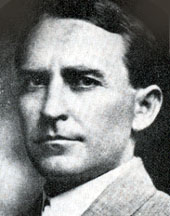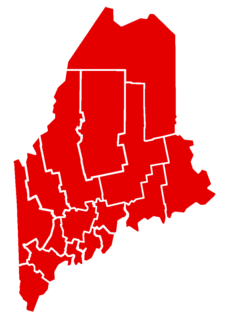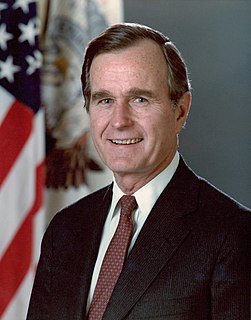
The United States presidential election of 1936 was the thirty-eighth quadrennial presidential election, held on Tuesday, November 3, 1936. In the midst of the Great Depression, incumbent Democratic President Franklin D. Roosevelt defeated Republican Governor Alf Landon of Kansas. Roosevelt won the highest share of the popular and electoral vote since the largely uncontested 1820 election. The sweeping victory consolidated the New Deal Coalition in control of the Fifth Party System.

The Cook Partisan Voting Index, often abbreviated as CPVI or simply PVI, is a measurement of how strongly a United States congressional district or state leans toward the Democratic or Republican Party, compared to the nation as a whole. The index is updated after each election cycle. The Cook Political Report introduced the PVI in August 1997 to better gauge the competitiveness of each district using the 1992 and 1996 presidential elections as a baseline. The index is based on analysis by the Center for Voting and Democracy for its July 1997 Monopoly Politics report.

The 1954 United States House of Representatives elections was an election for the United States House of Representatives in 1954 which occurred in the middle of President Dwight Eisenhower's first term. Eisenhower's Republican Party lost eighteen seats in the House, giving the Democratic Party a majority that it would retain in every House election until 1994.

The 1936 United States House of Representatives elections was an election for the United States House of Representatives in 1936 which coincided with President Franklin D. Roosevelt's landslide re-election. Roosevelt's Democratic Party gained twelve more net seats from the Republican Party, bringing them above a three-fourths majority. This was the largest majority since Reconstruction. The last time a party won so decisively was in 1866.

The Literary Digest was an influential American general interest weekly magazine published by Funk & Wagnalls. Founded by Isaac Kaufmann Funk in 1890, it eventually merged with two similar weekly magazines, Public Opinion and Current Opinion.

The 2010 Maine gubernatorial election took place on November 2, 2010. Incumbent Democratic Governor John Baldacci was term-limited and unable to seek re-election. Primary elections took place on June 8, 2010. The candidates who appeared on the November ballot were : Eliot Cutler (Independent), Paul LePage (Republican), Libby Mitchell (Democrat), Shawn Moody (Independent), and Kevin Scott (Independent).

The 1994 Maine gubernatorial election took place on November 8, 1994. Independent candidate Angus King defeated Democratic Party candidate Joseph Brennan, a former Governor of Maine, Republican Party challenger Susan Collins, a regional coordinator of the Small Business Administration, and environmentalist Jonathan Carter. Ed Finks, as a write-in candidate, took in 1.29% of the vote. Incidentally, both King and Collins now serve together in the United States Senate.

Janet Trafton Mills is an American lawyer and politician serving as the 75th Governor of Maine, since January 2019. She previously served as the Attorney General of Maine on two separate occasions.

The 1940 Maine gubernatorial election took place on September 9, 1940. Incumbent Republican Governor Lewis O. Barrows was term limited and unable to seek re-election. Republican Maine Senate President Sumner Sewall faced off against Democrat Fulton J. Redman in the general election, beating him easily. This election was the last gubernatorial contest in Maine held prior to United States involvement in the second world war.

Elections were held in Maine on November 2, 2010. Primary elections took place on June 8, 2010 for the Democratic Party, Republican Party, and Green Party.

The 1996 United States Senate election in Maine was held November 5, 1996. Incumbent Republican United States Senator William Cohen decided to retire instead of seeking a fourth term. To replace him, United States Congressman and former Governor of Maine Joseph E. Brennan won the Democratic primary while political consultant and 1994 nominee for Governor of Maine Susan Collins won the Republican primary. A competitive general election ensued, but Collins ultimately won out over Brennan, keeping the seat in the Republican column. With Collins' election to the Senate in 1996, Maine became only the second state after California to have two sitting women senators.
"As Maine goes, so goes the nation" is a phrase that at one time was in wide currency in United States politics. The phrase described Maine's reputation as a bellwether state for presidential elections. Specifically, Maine's September election of a governor predicted the party outcome of the November presidential election in 19 out of the 26 presidential election years from 1832 to 1932, or 73 percent of the time. The accurate years were from 1832 through 1844, in 1852, from 1860 through 1876, in 1888, from 1896 through 1908 and from 1920 through 1932.
Sherry F. Huber is an American politician and environmentalist. Huber, a resident of Falmouth, Maine, was a Republican member of the Maine House of Representatives from 1976 to 1982. Considered a moderate, Huber focused much of her time in the legislature on energy issues. In 1982, Huber ran for Governor of Maine, finishing second in the Republican primary behind Charles Cragin. She became the first woman ever to run in the Republican Party for Governor of Maine while, in the same election, Rep. Georgette Berube challenged incumbent Democrat Joseph Brennan. Huber ran unenrolled in 1986, finishing third with 15.7%. During the 1986 election, Huber was unanimously endorsed by the Maine Lesbian-Gay Political Alliance. In 2008, Huber was named as a notable Republican supporter of Democratic presidential candidate Barack Obama. She has been the long-time Executive Director of the Maine Timber Research and Environmental Education Foundation.

The 2014 United States Senate election in Maine took place on November 4, 2014. Incumbent Republican Senator Susan Collins, who has served in the position since 1997, won reelection to a fourth term in office with 68% of the vote. The primary elections were held on June 10, 2014.

The 1988 United States presidential election in Maine took place on November 8, 1988, as part of the 1988 United States presidential election, which was held throughout all 50 states and D.C. Voters chose 4 representatives, or electors to the Electoral College, who voted for president and vice president.

The 1936 Maine gubernatorial election took place in September, 1936. Incumbent Democratic Governor Louis J. Brann did not seek re-election. Republican Lewis O. Barrows defeated Democratic Party candidate F. Harold Dubord and former Republican turned independent state legislator Ben Bubar, Sr..

The 2016 United States presidential election in Maine was held on November 8, 2016, as part of the 2016 United States presidential election in which all 50 states plus The District of Columbia participated. Maine voters chose electors to represent them in the Electoral College via a popular vote pitting the Republican Party's nominee, businessman Donald Trump, and running mate Indiana Governor Mike Pence against Democratic Party nominee, former Secretary of State Hillary Clinton and her running mate, Virginia Senator Tim Kaine.



















